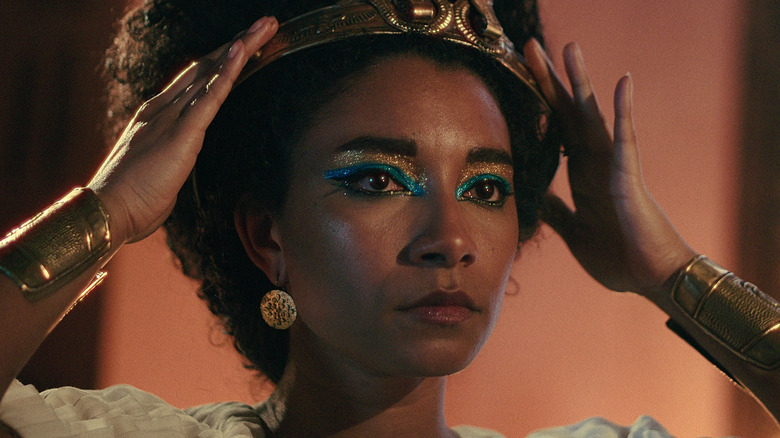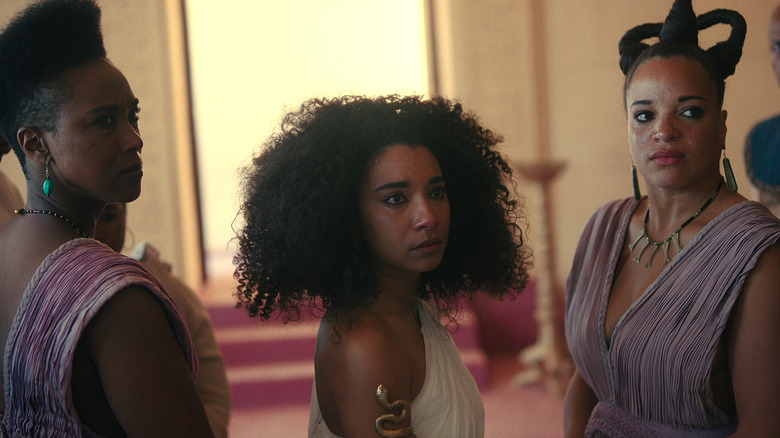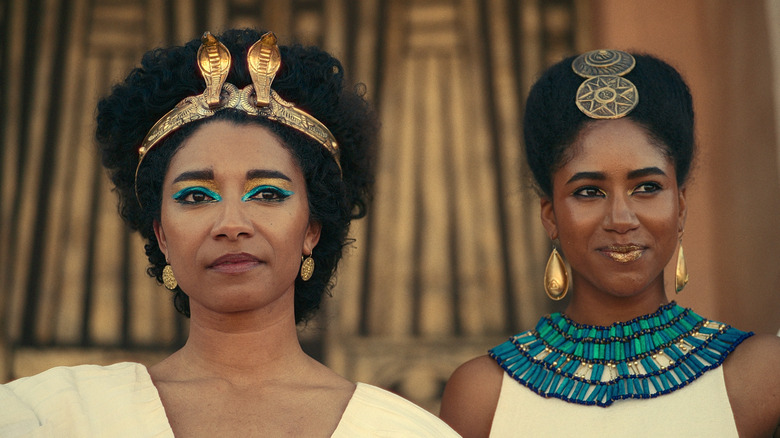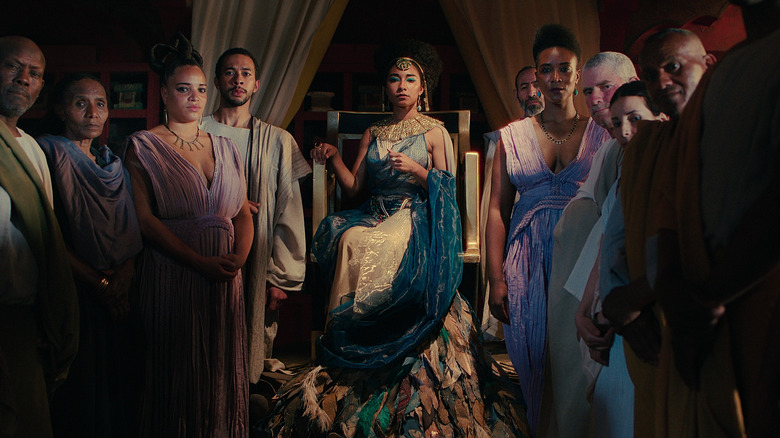How Accurate Is Netflix's Queen Cleopatra Docudrama?
"Among the most famous women to have lived, Cleopatra VII ruled Egypt for twenty-two years. She lost a kingdom once, regained it, nearly lost it again, amassed an empire, lost it all. A goddess as a child, a queen at eighteen, a celebrity soon thereafter, she was an object of speculation and veneration, gossip and legend, even in her own time." These were words delivered expertly by Stacy Schiff, author of "Cleopatra: A Life." While she worked tirelessly to bring the real Queen of Egypt to life in her writing over a decade ago, we still see Cleopatra mainly as the seductress presented by Elizabeth Taylor.
The truth behind Cleopatra is shrouded in mystery due to many different accounts over the last 2,000 years. Pulling back the curtain on Hollywood's portrayal of one of the most famous female leaders in history involves peeling layer after layer of mistruths, intentional embellishment, and devious downplaying. While historians have had difficulty finding the truth behind her two decades of rule, Hollywood has done their own work to muddy the waters.
Netflix is the latest studio to attempt a recreation of Cleopatra's life with the release of the documentary "Queen Cleopatra." Like all attempts to recount her rule, some of it is real, some of it is inaccurate to the point of being ludicrous, and the rest is somewhere between.
Casting a Black actress caused controversy
Of course, hashing out the accuracy and inaccuracy in this documentary starts with the casting choices. Putting Adele James ("Casualty," "Acceptable Damage") in the lead role was explained by Netflix's creative team on Tudum. "Her ethnicity is not the focus of Queen Cleopatra, but we did intentionally decide to depict her of mixed ethnicity to reflect theories about Cleopatra's possible Egyptian ancestry and the multicultural nature of ancient Egypt," said the show's producers.
However, Egyptian officials in Cairo claim the series is blackwashing the role, something that Dr. Mostafa Waziri, secretary-general of the Supreme Council of Antiquities, called a "falsification of Egyptian history and a blatant historical fallacy" in an interview with NBC. Waziri added that those in charge should "investigate accuracy and rely on historical and scientific facts." While there is plenty of backlash on the casting of the titular role, James feels the debate is off the mark.
In an episode of The Wayne Ayers Podcast, James said she believes that the argument is wrong and that it is sad that the show's detractors are so threatened by Blackness they resort to separating Egypt from the rest of Africa. This isn't the only contested historical content in the series, as there are some liberties taken by the writers.
There are shades of accuracy
The two most significant ways the documentary muddies the waters of the true history of Cleopatra lay in the depiction of the family and her upbringing. As far as the family goes, the accepted version of her parentage is that she is the daughter of Ptolemy XII and Cleopatra V. However, the documentary goes to great lengths to say that we don't know who the mother was, allowing them to depict her and her family however they see fit. This doesn't work if they add in the Roman busts and coins that depicted her and her family as more Greek in heritage, so they simply avoided having them present.
There is also the matter of her family dynamics depicted as simple scuffles instead of a brilliant strategist moving pieces across a chess board to remove her rivals for the throne. Combine that with her inexplicable training sequence in Syria that resembled a gladiatorial journey akin to Russell Crowe's in "Gladiator," and you get the feeling that Netflix took a lot of liberties.
However, outside of the reenactments that embellish the queen's life, the documentary leans on the presentation of actual historians that lend credibility to the story presented. This includes Deborah Heard, a Ph.D. candidate in Egyptian Studies, and Dr. Islam Issa, author of "Alexandria: The City that Changed the World," who start off right away by depicting her as a brilliant woman who spent an immense amount of time in the Library of Alexandria learning the Egyptian language and preparing herself to be a queen.
Where entertainment meets wish fulfillment
The documentary aims to create a new hero for Black women everywhere. The story is presented as a black queen rising up to lead her people in the time of Greek and Roman influence, setting up a role model for women of all races. However, an air of wish fulfillment seeps through while the documentary embellishes the more vague and mysterious aspects of her life. What the documentary does best is introduce Cleopatra to a new audience, with the apparent goal of sparking interest.
While Cleopatra is definitely one of the most influential figures in all of history, regardless of gender, race, or nationality, she seems to continuously get lost in the throes of societal bickering. While she was initially dismissed as a figurehead and a puppet by writers threatened by a woman in power, then reimagined as a seductress and defined by her trysts with Romans, Julius Caesar, and Mark Antony, she is now suffering from more societal infighting. That causes her story to be muddied yet again.
One thing is for sure — every time someone decides to depict the last Queen of Egypt, her story gets more shrouded in mystery. Maybe someday we will get the opportunity to see Cleopatra as someone who is more than skin deep.



